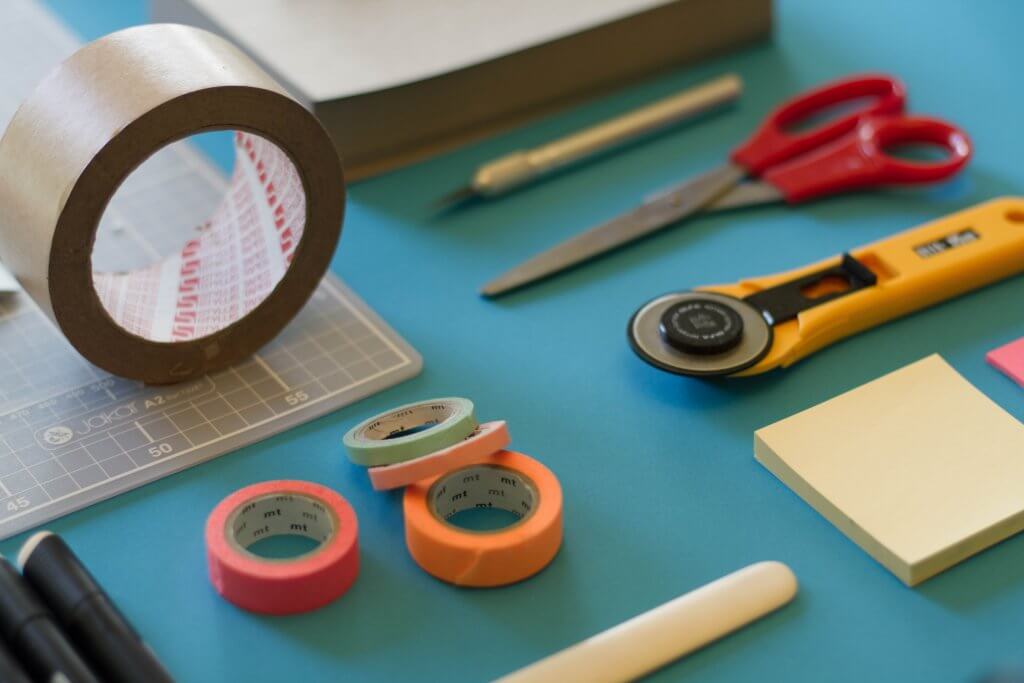New Year’s fuss and Jingle Bells tunes urge us to have a fresh start to the brand-new year—by setting ambitious goals, taking care of our body and soul, learning new skills, and so on. As a college student, you are especially thrilled about what you can achieve this year. But the truth is we rarely succeed in these ventures if our environment—physical, digital, and mental—is cluttered and messy. If our lives are full of unwanted things that we don’t dare to get rid of, in the end, we let the clutter drag us down. This is not a way to succeed in college and boost your learning achievements!
There are tons of decluttering advice out there, but the most viral one—Marie Kondo’s “Konmari” method based on ultimate minimalism—doesn’t apply to our student lives; let me show you why. Take any item from your shelf, let’s say any used college book, and ask yourself, “Does it spark joy in me?” Well, of course not. How can Essentials of Statistics spark joy in any human being? Appealing only to your emotions and memories, as Konmari preaches to us, you will thoughtlessly wave goodbye to almost all of your college books, notes, and textbooks. But what if you still need them for your finals or future classes?
Below, you will find a refined method for tidying up and organizing, designed to accommodate the problems faced by every college student. If you ever found yourself asking, “What should I do with old textbooks?” or trying to find that one useful note in a pile below your table—read these useful tips before it’s too late and get ready to start your year clean and neat and equip yourself with perfect study habits! Obviously, Christmas time gives a magic thrill to all these cleaning and sorting out activities, but feel free to apply this advice whenever you feel burdened by your lecture notes, printouts, or used college books.
It is hard to overrate the importance of clean and neat spaces, especially for university students. A thoughtful organizing system for your study materials boosts your energy, which can’t be applied to your cluttered shelves full of stationery, cosmetics, and broken appliances or that pile of old textbooks in the corner of your dorm room or at your parents’ attic. Again, the start of a new year (and of a new decade, let’s play big) is the best time to get your mess organized and have a new beginning with neat spaces, a clear head, and the baggage of good habits.
Marie Kondo’s advice to declutter shouts at us literary from every corner, this year also from our dear Netflix. In a nutshell, you should take all the items from the same category, for example, toiletries and cosmetics, assess the value of each item (if it makes you happy or not), and if not—thank it for the memories and say goodbye. As for what is left, you can organize it neatly in boxes and on your shelves, arrange them vertically so that you can easily see your belongings (update yourself on the Konmari folding method if you haven’t already, that’s a game-changer). The system is indeed intuitive and genuine when dealing, for example, with your clothing—so please apply it! I won’t elaborate more here; you can easily find the original idea in her The Life-Changing Magic of Tidying Up.
But what about college books, notes from your textbooks, lecture notes, and printouts? The Konmari method is somewhat silent on this matter, especially if some of your college subjects don’t “spark joy” in you. Order, tidiness, and good-balanced minimalism are much needed for college students—it is literary a key to our learning success. Most of us live in dorm rooms or shared apartments designed to inevitably lack space. Here are some student-tailored tips for those who don’t know what to do with your old textbooks, study notes, and binders—these will help you keep your space tidy and your learning routine organized and even earn money.
Step 1: Assign Spaces for Your Activities

The first step is surprisingly not related to managing your study materials. You need to assess your routine on a large scale—how much space do I have, and what kind of activities do I perform there? The ultimate advice is to separate your study area (with imaginary walls) from your sleeping, eating, and chill-out areas. You should then keep your possessions according to their function—if it’s a textbook, it goes to your study zone and nowhere else; if it’s a cushy-mushy pillow—a chill zone where you watch series. This has a great psychological effect—when you appear in your study zone, you don’t have any physical objects distracting you or urging you to do any other activity (which means—you procrastinate less). This creates a mental link between the space and the action, and you become more determined and less easily distracted. Apart from this, it helps you to keep your stuff organized and to know where to find your yoga mat, sunscreen, or stapler.
The advice is valid for your devices, too. Try to keep chatting and “fun-browsing” limited only to your phone and reserve your laptop for writing assignments, preparing internship applications, buying textbooks, registering for your classes, and other serious stuff. I know it’s hard, but it eventually becomes a great productivity habit.
Step 2: Sort Out Your Books and Textbooks
Turning now to the juicy stuff—our main dust collectors—books. In the following steps, I discuss mostly your study-related books and college textbooks, but if you happen to have a great collection of sci-fi, fiction, or detective stories (or you are on a literature track), you can easily modify these steps for your own needs.
- First, take all the books from your shelves, from under your bed and the desk, and place them on the floor.
- Look at each book one by one, decide if it is relevant for your current timetable or upcoming finals (scrutinize your timetable and program webpage beforehand), and place it in one of the three groups:
- Group 1: Textbooks you can swear are still relevant (useful reference books are also in this category).
- Group 2: All used college books you do not need anymore—when these are from previous semesters, exams are all done, and similar subjects won’t appear on your timetable.
- Group 3: Those are books you are hesitant about. You might need some entry-level college books to refresh your knowledge, or a college book has useful information related to your freelance job and so on.
- Books from Group 1 will appear on your orderly shelves—go to paragraph 5 for arranging materials.
- Group 2 requires more sorting out before you can do something about these books:
- If a textbook is rented from your college library or a textbook renting platform—put it aside, check that there are no stickers or notes in it, put a sticker on the book’s cover referring to the place you need to bring or send it to, and return it the next day to avoid fees for overdue rentals.
- If you have younger friends or siblings in the same program or college you attend, they might need some of these textbooks (ask them if they need this used textbook or have already bought one). If not—turn to the next step.
- It comes as a bummer, but you can actually sell your college textbooks online and make some money. The obvious choice is some online marketplace (Facebook, Amazon, or even some local ones, you name it), but the problem is you can wait for ages before your textbooks are sold at a reasonable price. And then what’s the point of tidying up your mess if it’s still with you? Waiting for end-of-semester textbook buybacks is not a quick fix either (moreover, you won’t know your price in advance, and they’re quite low anyway). A solution many college students swear by is to use online textbook buyback platforms like BooksRun where you can sell back your books in the blink of an eye and get money within a week. You declutter while other college students buy their textbooks cheaper—it’s a win-win situation.
- Group 3: Here, you need to be honest with yourself. Are you really going to browse through your 400-page Fundamentals of Physics before the start of the next semester? First, multiple refresher courses or shorter summaries are available online to help you recover this knowledge from your memory. Moreover, you might attend other lectures. And finally, if you really need this book again, you can always rent this textbook for a brief period—some textbook buyback platforms have a rental option, which is much cheaper than buying a new textbook. So I hope most of the college books from your Group 3 will end up not cluttering your desk but will be given away or sold back: it will save you space, time, and money.
One more thing—stay determined and get these nonrelevant books immediately out of your space! Otherwise, your nostalgic second thoughts can conquer your wish for a brand-new studying routine, and eventually, you find yourself unpacking the old textbooks you planned on selling the day before (and we don’t want this, right?)

Step 3: Tidy Up Lecture Notes and Printouts
Over the years in college, we tend to accumulate not only old textbooks but also handwritten notes, assignment drafts, printouts of our teacher’s slides, and other study papers. The following tips are useful if you want to successfully deal with your study notes by selecting the useful ones from those that are just paper trash and organizing them correctly.
- The first step is always the same: take everything you have out on the floor and make it visible. Do not do this exercise in one physical area (like one box or a drawer per time), or you will end up just rearranging what you have in there instead of sorting it out. Instead, you should go ahead by clusters of objects (first binders and notebooks, then printouts, for example); ideally—all in one day, but we know New Year’s Eve is a busy time.
- After it has all been laid out, take one object (let’s say, a binder with your Neurobiology notes) and ask yourself, “Will I use it in the future, like, honestly?” That’s rather vague, but you got the idea.
- Can the information from your notes be found online or on your course Moodle page? If yes—then the notes go to the trash.
- Do you have a digital version of these notes? If yes, you know what to do.
- Was it lying around in your drawer for three semesters, and you never looked through these notes?
- Are these just copied paragraphs from your college textbook? This type of notetaking has proved to be rather disadvantageous; it helps neither memorizing nor retrieving from your memory. If you need to consult the textbook you don’t have anymore, you can easily rent it.
- Do these notes hold any information for my future career or current part-time job? Remember, poorly kept notes from your anthropology class won’t be helpful for your future career as a journalist.
- Only keep those notes that are your thoughts and interpretations of the material (which is the best way to take your notes)—it shows you have internalized the material, and these notes can be a pathway for retrieving knowledge.
As a footnote—you spend a fair share of your time in college on your laptop or iPad, so keep them neat, too. Although they do not get heavier as you pile useless files and notes there, it affects your productivity. So structure your material, arrange it into folders, and delete what you don’t need—all the tips for “real” objects are also relevant to your e-zone. A good tip is to scan your handwritten notes and store them neatly on your laptop or online in a folder with other materials for the class. There are even programs that can make your handwriting searchable!
Step 4: Organize Your Stationery

Here, everything is easy-peasy: get all those pens, stickers, and empty binders out and look for those that are broken or too old to use them again—recycle when possible; otherwise, throw them away. Some things might not be meaningful for you to keep anymore: you don’t keep your notes in A4 binders, so you no longer need either these binders or a punch hole. Try to ask your roommates and classmates or post to a relevant group—it’s always better to give away! You also might have a lot of duplicates: if you regularly use markers, keep all ten you have. If not—again, give them away. When organizing your stationery items, prepare one set for your pencil case and store other duplicates in a box.
Step 5: Arrange Textbooks and Other Materials You Need

So now, you ended up having piles of useless papers and broken pens that go to the trash, some college books you are going to sell, stationery items for your classmates, and only a small amount of useful textbooks, reference materials, pens and notebooks, and neatly-taken and unique lecture notes. Don’t hurry up to put them thoughtlessly on your shelves; take time to create a system.
I hope you do have a few empty shelves; if not, getting a shelf storage system that fits in your room can be a sound investment for the money you earn from selling college textbooks. Arrange your textbooks vertically, according to the subject, followed up by your binders or notebooks (you can use colorful dividers or even place them one after another according to your semester timetable); never put your books on top of each other; it creates a mess! Each textbook and notebook should have their places, and they should always be returned to these places (treat your shelf like a library).
Another tip is to have easy access to your reference materials, college books, and notebooks, which you use almost daily. By this, we mean placing them on a shelf at your hand or eye level next to your desk—it will save you time finding and putting them back. You can reserve upper and lower shelves for less needed items, like that box with stationery duplicates, or even store your seasonal clothing and footwear packed in boxes.
Step 6: Avoid Cluttering in the Future
Obviously, the secret is to keep this organizational system running and keep your space tidy throughout this coming year. And here are some terrific tips for the future!
- Think twice before buying something new—it should become a mantra for all of us. Also, don’t fall for marketing bait—that wonderful 50-dollar organizer won’t make you study better or create more hours in your schedule.
- To avoid further cluttering, keep selling back your books after the semester ends. There are thousands of students who would be happy to buy your used textbook. As was noted before, endless rereading does not make you an effective learner (and just owing a textbook on your shelf won’t either)—sell it instead!
- You should adopt the habit of buying used textbooks for your future classes. First of all, it saves you money! Moreover, it is mentally easier to part with an already-used college book at the end of the course than with a brand-new one you own. By buying used books, you also actually help other students to declutter!
- And for ultimate decluttering—think of renting some of your textbooks. It is again cheaper, and you avoid all this bustle around how and where to sell your textbooks—you just send the books back to the company you rented them from!
Decluttering is not only about managing your possessions and occasionally going through your dusty, used college books. It is about changing your attitude towards ownership and valuing your physical space. Also, remember—a used college book isn’t a symbol of your education; it doesn’t stand for your active knowledge either. So don’t treat these old textbooks and lecture notes as trophies of your university years! You should relate to your real achievements and the way you can apply the acquired knowledge and skills in your life.
Merry Christmas and Happy New Year to all of you!
Get more money for your buyback with our coupon code for 6%—GETMORE.


